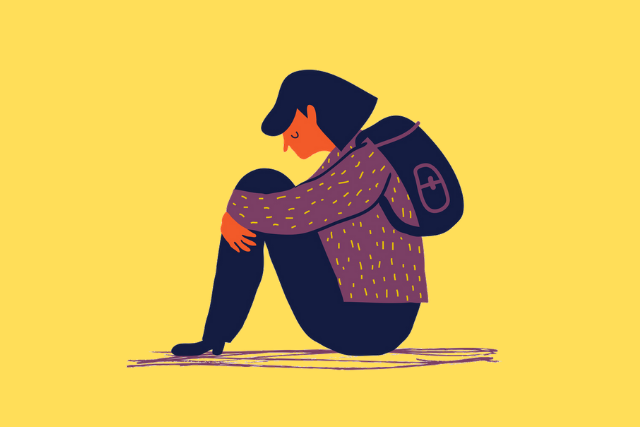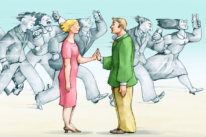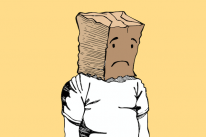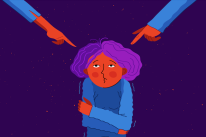
“What will mess you up most in life is the picture in your head of how it’s supposed to be.” ~Unknown
I may have said a few words that hurt my father’s feelings, but…
See, here’s the backstory.
I’m thirty-four years old, and I started having a relationship with my biological father at age twenty-one. During my childhood years I would see him every now and then even though he lived less than three miles away from my home. I don’t have any memories of being with my dad for birthdays, holidays, family vacations, or even just hanging out watching TV at home.
When I was twenty-one my father called and said, “Hey, I’m outside your house.”
I went outside and he said, “Your mom told me you just had another baby.”
I said, “Yes, I did.”
By this time I rarely had any dealings with my father, and I had some negative feelings about him because he was not in my life in the way I felt he should have been.
A part of me was upset and confused as to why he wasn’t around during my childhood when I needed him. I wanted his guidance and protection, and I felt that he hadn’t given that to me.
We had a conversation, and he told me that I was welcome at his home anytime and that I should come around more often. Despite how I was feeling, I decided I would give it a try because a part of me wanted to be daddy’s girl.
So, I did just that. I called him as often as I could and would go by his house for visits. I finally got comfortable enough that felt like I was in a good place with my dad. He has a wealth of knowledge, so we began having deep conversations about different things in life, and he would give me advice on things I was going through.
I couldn’t help sometimes but wonder, what would my life be like if he’d been there from the beginning?
I would look at him and his wife and the children they had together—they have so much joy and so many memories with my father. Why couldn’t I get that? Was it because of my mother? Was it because of his wife? What is wrong with me that I couldn’t get the same level of love and attention?
Recently I saw a post on Facebook by one of my siblings. It read, “I have the world’s greatest DAD!”
But that’s not who he is to me. I have no childhood bond with him. What we have shared these past thirteen years has been more of a great friendship. He’s not the world’s greatest dad, because if he were he would have been there for me! My emotions and feeling of neglect got the best of me, and I had to disagree with this statement.
The little girl in me was crying. Why couldn’t my father love me the way he loves his other kids? I felt unworthy. I also felt guilty, like I maybe I had done something wrong. Maybe I wasn’t perfect enough. Maybe he didn’t want me. I asked myself over and over, why couldn’t I have that love? All I wanted was his attention and acknowledgment.
If you have gone through this experience you know as you get older that little girl or boy is still hurting for the love they didn’t get. That pain often shows up as anger and resentment toward your parent(s).
The feelings I felt as a child followed me into my adulthood. I was insecure as a person and followed the crowd. I had a hard time trusting people to show up for me; I couldn’t get my own father to be there for me, so why would anyone else?
Since I felt unworthy of being loved by my father, I developed low self-esteem. Like a drop in the water, this caused a ripple effect. I ended up forming relationships with men who were just like the picture of my father; they would abandon me, and once again I’d feel unworthy of love.
In order to stop this ripple effect from controlling my life, I had to acknowledge that little girl inside me. I had to let her know that I heard her, and I felt her pain. So I started journaling about my feelings. I took that energy out of my body and left it on the paper.
I also had to have tough conversations with my parents. This was hard because it meant everyone needed to take accountability for their part in this situation—myself included. That meant releasing the expectations I’d placed on my father, which I’d never communicated to him. I recognized that I’d wanted him to be something he wasn’t, I wanted to change him, but I realized that I can’t control or change anyone but myself.
This is the part where I hurt my father’s feelings.
I needed to have this conversation with my father and get these feelings off my chest. I knew there was a possibility he wouldn’t understand, because he may have felt justified in his absence. But I also knew the pain I was feeling was not my fault.
I called him, and I stated, “Dad, I feel like we are really good friends, but I don’t feel like you are my dad. I have no childhood memories with you, but I know I can always call you for advice now.”
I wasn’t trying to hurt his feelings. I wanted to explain my feelings, based on my experience and my perception. I didn’t really know why he wasn’t around during my childhood; I just knew I didn’t get my dad.
He responded with, “It sounds like your saying I’m a failure.”
I said, “No, I’m just sharing how I feel.”
I took a few days to think about this conversation because it was tough for the both of us. I’d cried, and I could tell he felt disappointed. I realized then that just because people have children, that doesn’t mean they are ready to be parents.
We think two people meet, fall in love, get married, plan to have kids, and plan out their career. Sometimes it happens that way. But often they really love and care about each other, and then they get pregnant, unexpectedly. Then things go south, and co-parenting goes with it. At least this was my reality with my parents. Neither was there to raise me in the way I thought parents should.
I have no clue what specifically they were going through at that time. But whatever it was, it required me to live with my aunt till I was in third grade.
My Ah ha! Moment
A mother and father give you life, but that doesn’t mean they will be the ones who raise you. I have a mother and a father, but my aunt who stepped in and took me to live with her and her three children was my mother.
My “dad,” who was my uncle, picked me up almost every weekend and promised to protect me from all danger.
I had another “dad,” who just happened to be my grandfather; he provided for me like a father would.
When I eventually went to live with my mother, her boyfriend at the time treated me like his own daughter.
I realized then I’d been wrong when I told myself I didn’t have a dad, because I clearly did.
Plenty of people had stepped in as father figures even though they had no obligation to do so. They created those birthdays, holidays, vacations, and just hanging out at the house type memories that I was looking for from my father.
I was blinding myself to my blessings and holding my parents to an expectation that they were never going to be able to fulfill.
As a child I wasn’t able to look at them for who they truly are or accept them with the good and bad. As an adult, I focused so much on what I was lacking in my relationships with them that I couldn’t see what I’d had in other people all along.
I know now that I want to lead my life with love. That means accepting people for who they are and how they are, not what I would like them to be.
Though the pain I felt when it came to my father was not my fault, my healing was my responsibility. As an adult, I’m now capable of taking responsibly for my life decisions in a way I wasn’t as a child. I had to take my power back and stop letting my pain control me.
I told my father, “I’m not trying to hurt you. Things just are the way they are. It’s not good or bad; this is just our experience. Having you as a friend is better than having nothing at all.”
I now call my dad often, because I know it’s difficult to find good friends. I’m happy to say that I have found one in my father.
I think I’d just been caught up in the personal emotions and attachments to the people who gave birth to me and expected them to be X, Y, and Z. As a result, I caused myself a lot of unnecessary pain and suffering. I had to forgive both my parents and myself for holding on to these expectations.
If we can let go of expectations and focus on appreciating the people who are there for us we can find healing in the painful truth. I think this is a key to finding peace with things that have hurt us. We have a picture in our minds that doesn’t match up with our reality. When this happens, we may feel disappointed and close ourselves off to other perspectives.
Like me, you may not have had the relationship you wanted with your parents, but perhaps foster parents, aunts, uncles, brothers, or friends stepped into your life and become that dad or mom when they had no obligation to do so.
To those people in my life I say thank you. It’s hard to see, at first, just how much you’ve done. As a child our pain can blind us from the love we are given. Because of your love, people like me can stop and say, “I did have mom or dad.”
This insight doesn’t only apply to parents. Have you ever held someone to certain expectations, just because of who they are to you? Like a husband or wife, mother or father, brother or sister, aunt or uncle, grandparents, best friend, boss, co-worker, etc.
At times we expect people to fill certain roles just because of their label. Some expectations are reasonable and healthy, but can you perhaps release some and replace them with gratitude?
This is in no way, excuses anyone’s behavior or the pain they may have caused you. This is a step toward acceptance. Accepting people in their truth even when we don’t agree, this is taking back our power.
I know I can’t change who my parents are or what they’ve done, but I can always change my perspective by looking for positive aspects in each of them. I receive more from being grateful than I do with expectations.
I’ve stopped focusing so much on them and now focus more on myself, because I’ve realized the only person I can change is myself.
Forgive yourself for hurting yourself or others with expectations. Know that the pain you feel is real, and that you can release that pain from your life at any moment you choose. And allow yourself to be grateful for all the good in your life instead of focusing solely on what’s hurt you.
This is how I’ve healed some deeply rooted wounds that caused a great level of pain in my life. I hope by sharing my experience I’ve helped you take a step toward your own healing and understanding.
About Bridget Garcia
Bridget is a trained life coach and the co-founder of the podcast Silver-Reflections. A podcast that gives access to her life experiences and the strategies she has used that have led to her own level of healing, peace, and understanding. Visit silver-reflections.com to subscribe to her blog and listen to her podcast. Follow her on Instagram and Facebook.













 Though I run this site, it is not mine. It's ours. It's not about me. It's about us. Your stories and your wisdom are just as meaningful as mine.
Though I run this site, it is not mine. It's ours. It's not about me. It's about us. Your stories and your wisdom are just as meaningful as mine.
I nearly cry when I read this article… Childhood pain has ripple effects, which lasts to adult life if it’s not resolved. I can feel the pain you’re in. Because I’m in pain myself, many times I think of suicide.
I absolutely resonate with this story (with my mom vs dad) and really appreciate you sharing it!
That took allot of self awareness. Well done!.
Thanks for sharing and so well written
Great insightful piece. There are a lot of people who I have written off due to abuse or total lack of respect towards me. I believe in forgiveness, but also not to have toxic people in your life who don’t care one lick about you either. Out of one’s well being and happiness, it is important who you let into your life and who to keep at a distance. Good luck with the relationship with your birth father.
Oh, thank you! This has given me some insight to how my younger son feels since I was basically out of his life at birth. He’s said some of the same things to me and I just didn’t see where he was coming from.
This really resonated with me. I have been sad about the no communication I’ve been having with my brother-in-law for about 2 years. Although he is my brother-in-law, as you say he doesn’t necessarily have to act like Brother. It’s his loss. I’m willing to forget and forgive but apparently he isn’t. There are 5 more siblings in the family, including my husband, who treat me like a member of the family and who I love.
Oh man, this really hits close to home and is timely. I am a father who recently reconnected with his 18yo son. I also recently lost my father, who I have only seen maybe three times after reconnecting with him after 42 years. My relationship with my folks isn’t great and I try to navigate that with my mother. And I’m not trying to navigate things with my son. Needless to say, this post touched me in a way I wasn’t expecting this morning. Thank you for writing it.
It’s never too late🤩
Thank you for sharing. I can relate and this is helping me to move along on my journey. God Bless💖
“Some expectations are reasonable and healthy…”
That’s the one I often struggle with because of uncertainties within myself.